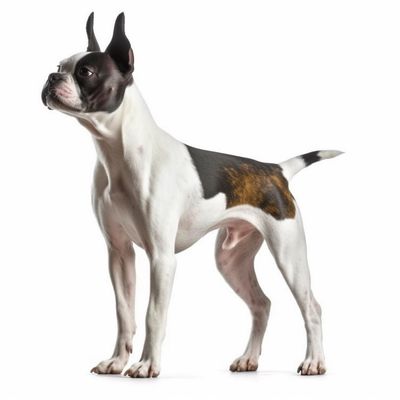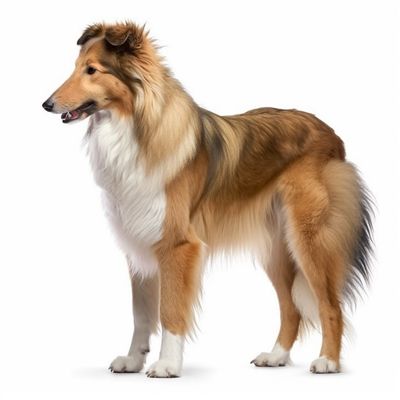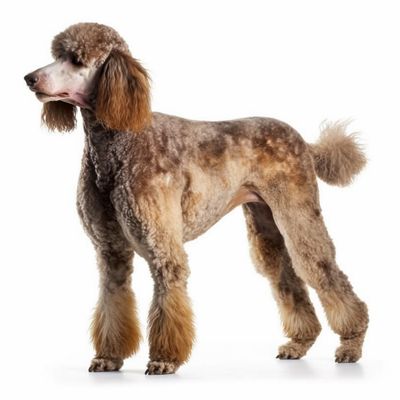Boston Terrier - vs - Rough Collie - vs - Poodle

Boston Terriers are small and compact, standing 15-17 inches tall and weighing 12-25 lbs.
Boston Terriers have moderate energy levels and enjoy daily walks, playtime, and interactive toys to stay engaged.
Boston Terriers require regular exercise, such as walks and playtime, to keep them mentally and physically fit.
Boston Terriers are intelligent and eager to please, making them moderately easy to train with consistency and positive reinforcement.
Boston Terriers are intelligent dogs, known for their problem-solving skills and quick learning abilities.
Boston Terriers are highly adaptable and can thrive in various living situations, including apartments and homes with yards.
Boston Terriers are gentle, patient, and loving, making them wonderful companions for children.
Boston Terriers usually get along well with other dogs and pets, especially if socialized from an early age.
Boston Terriers can manage in cold climates, but they require proper shelter and protection due to their short coats.
Boston Terriers can handle hot climates but require shade, water, and limited exercise during the hottest parts of the day.
Boston Terriers have short, smooth coats that shed minimally. Regular grooming can help keep shedding under control.
Boston Terriers require minimal grooming, with occasional brushing and bathing to keep their coats clean and healthy.
Boston Terriers bark occasionally, usually only when necessary or provoked.
Boston Terriers may experience some health issues and require additional care and attention, such as regular veterinary checkups, preventative care, and potential medication or treatments.

Rough Collies are large-sized dogs, weighing 53-60 lbs, with a height of 22-24 inches.
Rough Collies have a medium energy level, enjoying daily walks and playtime, but are also content with downtime.
Rough Collies need regular exercise, including daily walks and playtime, to keep them happy and healthy.
Rough Collies are intelligent and eager to please, making them easy to train with consistent, positive reinforcement.
Rough Collies are highly intelligent dogs, capable of learning a variety of commands and tasks quickly.
Rough Collies can adapt to different living situations, but they require enough space to move comfortably and regular grooming.
Rough Collies are gentle and patient, making them good with children when properly supervised.
Rough Collies can get along well with other pets, especially when raised together. Early socialization is important.
Rough Collies can tolerate colder temperatures, thanks to their double coat, which provides insulation.
Rough Collies can tolerate hot climates, but they need to be monitored for signs of overheating due to their thick coat.
Rough Collies have a double coat and shed heavily, requiring regular brushing to manage shedding and prevent matting.
Rough Collies require regular grooming, including frequent brushing and occasional bathing to keep their coats clean and healthy.
Rough Collies are generally healthy, but regular veterinary checkups and preventative care are still necessary.

Poodles come in 3 sizes: Toy (up to 10 inches), Miniature (10-15 inches), and Standard (over 15 inches).
Poodles are energetic and playful, enjoying daily walks, games, and activities.
Poodles need regular exercise to stay happy and healthy, like walks, playtime, or dog sports.
Highly intelligent and eager to please, Poodles can excel in obedience and agility training.
Ranked among the smartest breeds, Poodles are quick learners and problem solvers.
Poodles adapt well to various environments, from city apartments to suburban homes.
Poodles are gentle, patient, and loving companions for children of all ages.
Friendly and social, Poodles generally get along well with other dogs and pets.
Poodles can tolerate cold weather, but should have access to warmth and shelter.
Poodles can handle hot climates, but need shade, water, and breaks during hot weather.
Poodles have minimal shedding, making them a good choice for people with allergies.
Poodles require regular grooming, including brushing, bathing, and professional clipping.
Poodles have average bark tendencies and may bark for various reasons, such as alerting their owners or during playtime.
Poodles are generally healthy, but regular veterinary checkups and preventative care are still necessary.



